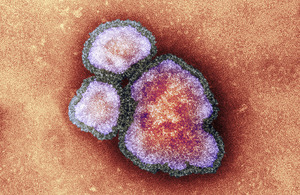Measles at highest level for 18 years
Measles is a highly infectious disease that spreads easily between people and in some cases can cause serious infection and death.

Measles
Measles usually starts with cold-like symptoms, fever and red, sensitive eyes. After a few days a red-brown spotty rash will appear. At best the illness leads to several days of misery, but in some people measles can lead to serious complications and rarely, the infection can be fatal. Complications include pneumonia and encephalitis (swelling of the brain).
There were 2,016 confirmed cases of measles in England and Wales in 2012, which is the highest annual total since 1994. Outbreaks across England and Wales have continued to cause high numbers.
Vaccination against measles has been available in England since the late 1960s and since 1988 the vaccine has been combined with those for rubella and mumps as the MMR vaccine. The MMR vaccine has been highly effective at reducing the number of infections we see in England. MMR is normally given just after the first birthday and again before starting school. Currently, the uptake of this vaccine is at the highest levels it has ever been. In the most recent quarter published uptake of two doses of MMR vaccine by five years of age was at 88.1% of the population. During the early 2000s, uptake in toddlers fell because of concern about an unproven link between MMR and autism. Although any such link has now been discredited, many teenagers who missed out remain unvaccinated and we are now seeing cases in these teenagers.
Dr Mary Ramsay, head of immunisation at Public Health England said:
“The only way to prevent measles outbreaks is to make sure there is good uptake of the MMR vaccine across all ages, and that when cases are reported, immediate public health action is taken to target unvaccinated individuals as soon as possible.”
“Measles is often associated with being a disease of the past and as a result, people may be unaware that it is dangerous and can lead to death in severe cases. Parents should ensure their children are fully protected against measles, mumps and rubella with two doses of the MMR vaccine.
“Parents of unvaccinated children, as well as older teenagers and young adults who may have missed MMR vaccination, should be aware it is never too late to get vaccinated against measles and they should make an appointment with their GP to get vaccinated as soon as possible.
“If you are unsure if you or your child has had two doses of the vaccine, speak to your GP who will have a record.”
The case totals of measles, mumps and rubella are reported by PHE on a quarterly basis. The next set of quarterly data for January to March 2013 will be published later this month.
Find out more about measles on NHS Choices.
Find out more about vaccine coverage for the UK.